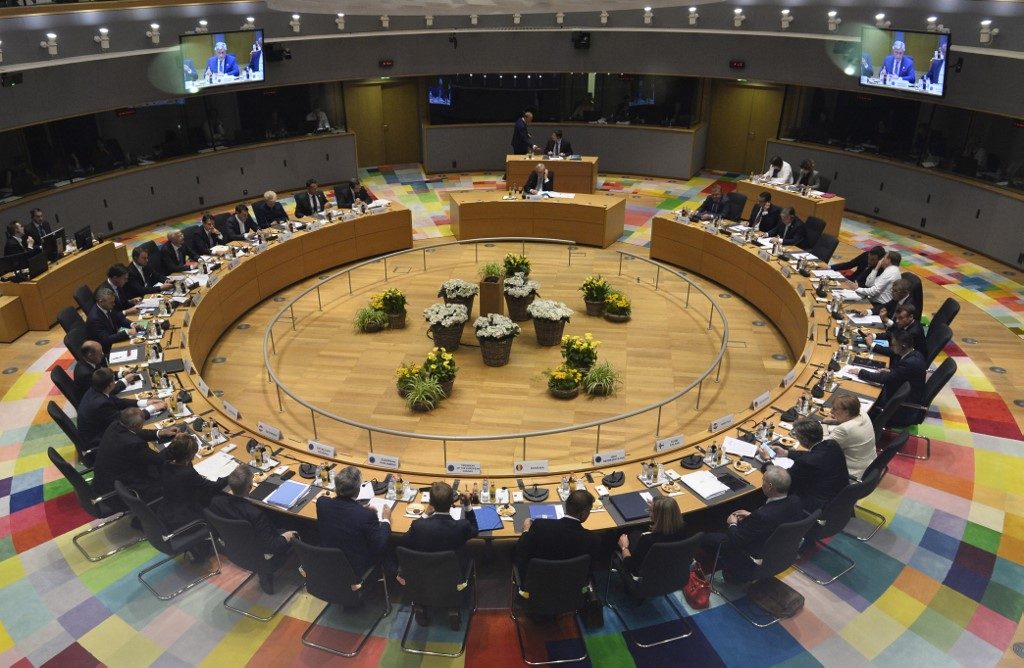SUMMARY
This is AI generated summarization, which may have errors. For context, always refer to the full article.

BRUSSELS, Belgium – European leaders met on Thursday, June 20, to seek a candidate for the EU’s top job, with all to play for after Brussels’ political factions failed to unite behind a single figure.
Arriving at the summit, French President Emmanuel Macron dismissed the idea that the new president of the European Commission should be chosen by the European Parliament.
The French leader said the two-day summit would demonstrate that the parliamentarians’ so-called “Spitzenkandidat” or “lead candidate” process is unworkable and that the union’s 28 national leaders must decide on the nominee.
“Maybe we’ll have a name at the end of this Council. But we should be realistic, it’s not certain,” he said.
Germany’s Chancellor Angela Merkel defended the political process, and noted that whichever name the leaders come up with will still have to be approved by a majority of MEPs in the incoming assembly.
“We will discuss this openly, and so it may be that there is no result today, but from my point of view that is not so dangerous,” she said, as several officials predicted another summit would be held on July 1, the day before the new parliament opens.
“Yesterday I was cautiously optimistic. Today I’m more cautious than optimistic,” warned Donald Tusk, the president of the leaders’ European Council, after pre-summit talks with Macron and Merkel.
None of the leading names to have emerged during last month’s election has won consensus support from the 4 main parliamentary parties to replace Jean-Claude Juncker as president of the EU’s executive arm.
Other jobs up for grabs include speaker of the European Parliament, which will sit for the first time on July 2, and foreign policy chief.
National leaders want to control the process and dole out the most senior jobs in a way that balances men and women, east and west Europe, small countries and large.
But the results of May’s European elections forced the main conservative, socialist, liberal and Green parliamentary blocs to form a majority coalition.
The parties, while working to draft a joint political program, have not united behind a particular package of candidates.
“My understanding is that it is a battle the parliament cannot win,” said Philippe Lamberts, the Belgian joint leader of the Greens group.
Lamberts said German conservative MEP Manfred Weber, whose center-right EPP group took the biggest single bloc of seats, had failed to win over Dutch social democrat Frans Timmermans’ S&D or the liberal Renew Europe group, which is backed Danish commissioner Margrethe Vestager.
Power-sharing deal
Whoever is eventually the nominee must win the backing of least 21 of the 28 EU leaders and a majority in the 751-member parliament.
According to 3 sources close to the negotiations, the leaders are expected to agree that the EPP will be allowed to propose an alternative to Weber for the Commission presidency.
Renew Europe hopes to see a liberal replace Tusk as president of the leaders’ European Council, and the socialists will provide a foreign policy chief.
Finally, the Greens could share the job of presiding over the five-year parliament with the socialists, with each providing a speaker for two-and-a-half years.
“But all this could still shift a bit,” a European official warned.
Even if the rumored jobs breakdown holds, it would remain to pick names, and Tusk has promised to try and find posts for at least two women.
What does France want?
Macron had frustrated Merkel by opposing her German ally Weber without offering an alternative, but the pair have been in touch daily in the run-up to the meeting and, in the words of a senior German diplomat, “now we know what the French really want.”
One option might be Europe’s ambitious Brexit negotiator, Michel Barnier, a former French minister who is also a member of Merkel’s EPP.
But the party is said to have other names up its sleeve and French and German sources agree the chancellor is not ready to cede the prize to a Frenchman.
Brussels wants to move quickly but if there is no final agreement, talks will continue.
The 6 EU leaders invited to the G20 summit in Osaka on Friday, June 28, and Saturday, June 29 – from France, Germany, Britain, Italy, Spain and the Netherlands – will continue the discussion there.
And then, all 28 could return to Brussels on July 1, one day before the parliament begins its opening session. – Rappler.com
Add a comment
How does this make you feel?
There are no comments yet. Add your comment to start the conversation.